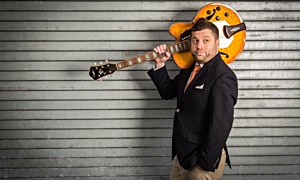Home » Jazz Articles » Guitarist's Rendezvous » Steve Herberman, Hristo Vitchev, Rick Stone and Harvey Valdes
Steve Herberman, Hristo Vitchev, Rick Stone and Harvey Valdes

This installment includes a diverse group of musicians from New York, California, and Washington DC.
Meet

Steve Herberman
guitar, electricb.1966
Steve hails from Washington DC. I met Steve about 15 years ago at a jazz conference in New York City. Just by talking to him I knew he was a great player. Checking out his website and video's confirmed it. What his website doesn't show is that Steve is nice guy who's has humility in abundance. Steve was born in 1966 in Bethesda, Maryland. He is a graduate of Berklee College Of Music. Later on in his career Steve switched to the seven-string guitar. He has performed at many venues throughout the US and the UK including the NAMM shows and has performed with some of the best musicians around including

Keter Betts
bass, acousticb.1928

Buster Williams
bass, acousticb.1942

Gary Bartz
saxophone, altob.1940

Ali Ryerson
flute
Steve LaSpina
bassb.1954

Jeff Hirshfield
drumsb.1955

John Pisano
guitar1931 - 2024
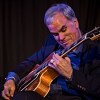
Steve Abshire
guitarQ: How long have you played the guitar?
A: 38 years
Q: Who are your major influences?
A: The following were (and still are) my heroes. I got into periods of listening a lot to each, roughly in this order beginning when I was around 14 years old:

Joe Pass
guitar1929 - 1994

Wes Montgomery
guitar1923 - 1968

Charlie Parker
saxophone, alto1920 - 1955

Kenny Burrell
guitar, electricb.1931

Dexter Gordon
saxophone, tenor1923 - 1990

Art Tatum
piano1909 - 1956

Bill Evans
piano1929 - 1980
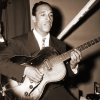
Oscar Moore
guitar1916 - 1981

Nat King Cole
piano and vocals1919 - 1965

Johnny Smith
guitar1922 - 2013

Lenny Breau
guitar1941 - 1984

George Van Eps
guitar1913 - 1998
Q: Why jazz?
A: The spontaneity has always appealed to me. The rhythms in the music, the use of all of the colors of the harmonic rainbow, the interesting people whom made/make jazz. Mostly the impressive repertoire by jazz composers, and the Great American songbook and music from other parts of the world, like Brazil, Europe and Africa, etc. Jazz ideally includes all music and it's amazing to hear a good soloist spontaneously compose a solo of great beauty, depth and complexity (or simplicity).
Q: Where do you think jazz is headed?
A: I believe that jazz will continue to embrace the new music styles that come along and keep improvisation at its foundation. Jazz will also hopefully always pay homage to the great advancements of the past and continue to champion the originality of the musical artist.
Steve Herberman is a guitarist deserving of further recognition. Check Steve out, especially his teaching videos and the fluidity in which he performs, believe me you won't be disappointed.
Meet
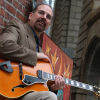
Rick Stone (Guitar)
guitar1955 - 2016
I met Rick around 1986 and hadn't heard him play till about ten years later at the old uptown Birdland in NYC. I was impressed. Rick was playing a D'Aquisto, Fender Arch-top guitar and sounded great. Since those years Rick has made quite a reputation for himself in the New York area, but he is still slightly below the radar of national and international recognition.
Born in Cleveland in 1955, he began playing guitar when he was nine years old. His musical quest led him to Berklee College of Music and then on to New York where he found a fertile and stimulating environment in

Barry Harris
piano1929 - 2021

Tommy Flanagan
piano1930 - 2001

Lionel Hampton
vibraphone1908 - 2002

Junior Cook
saxophone1934 - 1992

Jimmy Heath
saxophone, tenor1926 - 2020

Ted Dunbar
guitar1937 - 1998

Donald Byrd
trumpet1932 - 2013

Tony Purrone
guitar
Hal Galper
piano1938 - 2025

Peter Bernstein
guitarb.1967

Mark Elf
guitarb.1949

Roni Ben-Hur
guitar
Peter Leitch
composer / conductorb.1944

Freddie Bryant
guitarSol Yaged
b.1922
Irene Reid
vocals1930 - 2006
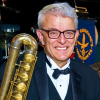
Vince Giordano
composer / conductorb.1952

Eric Person
saxophoneQ: How long have you played the guitar?
A: I've been playing over 50 years. I started when I was 8 years old on an old Harmony Stella that my parents rented from the store. It had strings way high off the neck and was really hard to play. I remember my teachers telling me "you gotta practice and get callouses kid!" I had an agreement with my parents and teacher that if I practiced at least a half-hour a day for a year, they'd get me an electric guitar. So in 1964 they got me an Epiphone Granada. No amp though! But it was a thin-line hollow body so you could hear it fine without an amp.
Q: Who are your major influences?
A: Early on I was into rock and blues so my influences then were Jimmy Page,

Eric Clapton
guitar and vocalsb.1945

Jeff Beck
guitar1944 - 2023

Jimi Hendrix
guitar, electric1942 - 1970

Johnny Winter
guitar, electric1944 - 2014
Then I started listening to

Miles Davis
trumpet1926 - 1991

Jimmy Smith
organ, Hammond B31925 - 2005

Larry Coryell
guitar1943 - 2017

John McLaughlin
guitarb.1942

Sonny Stitt
saxophone1924 - 1982

John Coltrane
saxophone1926 - 1967

Barney Kessel
guitar, electric1923 - 2004

Wes Montgomery
guitar1923 - 1968

Grant Green
guitar1935 - 1979

Jimmy Raney
guitar, electric1927 - 1995

Jim Hall
guitar1930 - 2013

Kenny Burrell
guitar, electricb.1931

Howard Roberts
guitar, electric1929 - 1992

Joe Pass
guitar1929 - 1994

Herb Ellis
guitar1921 - 2010
When I went to Berklee I was exposed to so many players. I saw

Lenny Breau
guitar1941 - 1984
I attended a clinic with

Joe Pass
guitar1929 - 1994

Barry Harris
piano1929 - 2021

Pat Martino
guitar1944 - 2021

Jimmy Heath
saxophone, tenor1926 - 2020

Ted Dunbar
guitar1937 - 1998

Hal Galper
piano1938 - 2025
Q: Why jazz?
A: Wow, I'm not even sure how to answer that one. For me, being any other kind of musician isn't even conceivable at this point. I think it was a gradual thing, but the more I played this music, the more I wanted to. Then I'd go do another kind of gig and it was "just work" (a paycheck). When I'm playing jazz, it's a kind of euphoria. I simply don't feel the same level of joy in playing other styles of music. I'm not sure at what point this occurred because I did enjoy playing other styles when I was younger, but they don't really appeal to me any more. I don't know if that will change, but that's what it's been for the last 35 years.
Q: Where do you think jazz is headed?
A: That's a tough one. Nowadays there's so much competition from social media, YouTube, etc. that it's difficult to get people to come out to concerts or purchase recordings in a number that can make these things sustainable. On the one hand we have instant access to so much music and information. But the flip side of that is that we don't have time to dive as deep into any of it. On the bright side; a week ago I attended the final concert of the Wes Montgomery Jazz Guitar Competition and the young guitarists performing were simply brilliant and certainly at a technical level much higher than anything I remember hearing from any of the guitarists their age (including myself) when I first came to New York. And of course, this is just the tip of a very large iceberg. But where are all these great players going to perform and who is going to be their audience? Here in New York you can hang at places like Smalls and Mezzrow, and see that there's still a vital scene of young musicians who want to play and listen to this. But for jazz to really survive and thrive the 21st Century, we need venues like this in every city.
Meet

Hristo Vitchev
guitarb.1980
Some years ago when I had my own record label, Hristo's manager sent me an email about him in hopes that I would sign Hristo to a contract. Graciously explaining it was strictly a label for my wife's recordings and mine, I thought that would be it, but Hristov wanted me to hear him, so he sent me his CD. I was immediately impressed by his playing and command of the instrument and I wanted to know more about him. Through the years we have remained in touch and his output of work is impressive. Born in Sofia, Bulgaria in 1980, this 35-year old jazzer now resides in the San Francisco Bay area. He is a graduate with a BA in improvised studies at San Jose State University. Not only is Hristo a great player he's an educator, author and composer. Receiving numerous awards and critical praise, Hristo Vitchev is jazz guitarist on the verge. Hopefully this little push will help.
Q: How long have you played the guitar?
A: I have played guitar for about 23 years, ten of which, I've spent playing jazz. My first exposure to the instrument was in the rock, heavy metal, and progressive styles. Little by little my ears kept evolving and searching for new colors, textures, and sonic palettes.
Q: Who are your major influences?
A: I have to say that some of my major influences are

Pat Metheny
guitarb.1954

Keith Jarrett
pianob.1945

Tord Gustavsen
pianob.1970

Gary Burton
vibraphoneb.1943
Q: Why jazz?
A: Jazz to me was one of the most inviting, liberating, exciting, and interesting styles of music. The liberty in communication, the depth, dimension, and musical dialogue that is possible within the jazz idiom and sensibility for me is the most attractive of all musical styles. It is a musical world that allows the complete, honest, and sincere discovery of yourself as an artist and person, and its ever-evolving personality and character are the driving force that fuels every artistic creation!
Q: Where do you think jazz is headed?
A: I think jazz is simply moving forward. For some people it may be a good or bad thing. Jazz is constantly evolving, progressing, assimilating with it new traditions, cultures, sounds, forms of expression and delivery, and most of all, truly reflecting the state, emotions, and feelings of the society we have created for ourselves. To me, jazz is a concept, an approach, and a way of thinking. It has surpassed the boundaries of a musical style.
At some point in the near future Hristo will become a household name. When he does, remember you heard it here first.
Meet
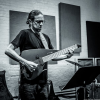
Harvey Valdes
guitarHarvey was born in April 1977. He grew up in Roselle, New Jersey and started coming to NYC at a very young age. He's lived in Brooklyn since 1999. Early on he studied with Chris Buono who turned him onto jazz. Chris recommended that Harvey study with

Vic Juris
guitar1953 - 2019

Reggie Workman
bassb.1937

Andrew Cyrille
drumsb.1939

Junior Mance
piano1928 - 2021

Jack Wilkins
saxophone, tenor1944 - 2023

David Fiuczynski
guitarb.1964
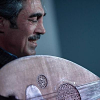 "
data-original-title="" title="">Simon Shaheen, "
data-original-title="" title="">Najib Shaheen,
"
data-original-title="" title="">Simon Shaheen, "
data-original-title="" title="">Najib Shaheen, 
Phil Markowitz
pianoI had heard of Harvey a few years ago when he started playing with

Blaise Siwula
saxophoneb.1950
Q: How long have you played the guitar?
A: 27 years and it still feels like a brand new thing.
Q: Who are your major influences?
A: I have very eclectic tastes that really run the gamut. But, regardless of genre there are unique individuals that have left a lasting impression on me. Musicians who continue to surprise and astound me include

Cecil Taylor
piano1929 - 2018

Pat Martino
guitar1944 - 2021

David Torn
guitar, electricb.1953

Miles Davis
trumpet1926 - 1991

Matthew Shipp
pianob.1960

Joe Diorio
guitar1936 - 2022

Lawrence "Butch" Morris
cornet1947 - 2013

Jimi Hendrix
guitar, electric1942 - 1970

Eric Dolphy
woodwinds1928 - 1964

Jaki Byard
piano1922 - 1999

Marc Ducret
guitarb.1957

Vic Juris
guitar1953 - 2019
Q: Why jazz?
A: I've always been fascinated by the intense interactions that happen between the players. Though there are many different styles within jazz, they all share an emphasis on a unified sound that is created by the spontaneous interaction of the players. That is the great challenge of jazz, to find a unified sound that is comprised of the spontaneous musical interaction of all the players. I find it really exciting to listen to the choices that players make in response to one another, the material itself, the audience, and their own internal musical spirit. The journey of learning and performing on my instrument with an emphasis on improvisation pushes me to discover new sounds, approaches to playing, and to listening.
Q: Where do you think jazz is headed?
A: Musicians from all over the world are doing all kinds of things with improvisation and composition. Improvisation is strongly associated with jazz but it exists in so many other types of music around the world. One thing that is exciting is seeing musicians expand their own ideas of what improvisation can be as a result of exposure to other types of music. Another exciting angle that's been happening is moving beyond the "tune." Musicians are taking ideas from long form compositional styles and are really pushing the boundaries on what kind of material can serve as the composed section of a piece. It's not just about the head and the solos anymore. For some purists, this brings up the debate of what jazz is or should be. But, I'm not concerned with that at all. Music is much bigger than tradition or genre. The more we can leave our comfort zones and learn from one another, the more we can collectively move jazz forward.
I couldn't have said it better. Harvey is one of a kind.
Tags
Comments
PREVIOUS / NEXT
Support All About Jazz
 All About Jazz has been a pillar of jazz since 1995, championing it as an art form and, more importantly, supporting the musicians who make it. Our enduring commitment has made "AAJ" one of the most culturally important websites of its kind, read by hundreds of thousands of fans, musicians and industry figures every month.
All About Jazz has been a pillar of jazz since 1995, championing it as an art form and, more importantly, supporting the musicians who make it. Our enduring commitment has made "AAJ" one of the most culturally important websites of its kind, read by hundreds of thousands of fans, musicians and industry figures every month.







 Buy Now
Buy Now




